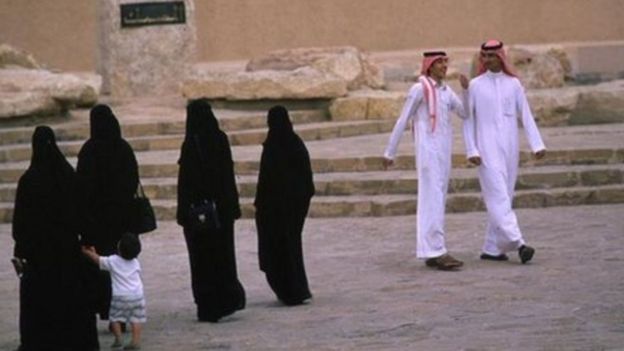 ARAB NEWS/YOU TUBE
ARAB NEWS/YOU TUBE
Meet Sophia, a robot who made her first public appearance in the Saudi Arabian city of Riyadh on Monday.
Sophia was such a hit she was immediately given Saudi citizenship in front of hundreds of delegates at the Future Investment Initiative in Riyadh on 25 October.
But as pictures and videos of Sophia began circulating on social media many started to ask why a robot already seemed to have secured more rights than women in the country.
Sophia, created by Hong Kong company Hanson Robotics, addressed the audience in English without the customary headscarf and abaya, a traditional cloak which Saudi women are obliged to wear in public.
"I am very honoured and proud for this unique distinction," she said. "This is historical to be the first robot in the world to be recognized with a citizenship."
You may also like:
- Female driving ban: Why did this selfie enrage some Saudis?
- The Saudi Arabian call to boycott Pizza Hut over advert
- Women have 'quarter of brain' says Saudi cleric
Saudi users hailed the development using the Arabic hashtag #Robot_with_Saudi_nationality nearly 30,000 times in the first 24 hours since the announcement.
But others took a more sarcastic tone. The Arabic hashtag #Sophia_calls_for_dropping_guardianship was also circulating, and has been used nearly 10,000 times to date.
Under the Saudi guardianship system every woman must have a male companion with her in public, usually a close family member, who has authority to act on her behalf.

"Sophia has no guardian, doesn't wear an abaya or cover up - how come?" commented one Twitter user.
While another posted an image of the robot's face with a black headscarf and face veil drawn on, with the caption: "How Sophia will look after a while"
But in addition to the posts comparing Sophia to Saudi women there was also discussion about the ease and speed in which she had been granted citizenship.
Journalist Murtaza Hussain posted: "This robot has gotten Saudi citizenship before kafala workers who have been living in the country their entire lives"
Under Saudi law, foreign workers can't leave the country without the permission of their employers - just one element of the Gulf system of kafala, which limits the rights of foreign workers.
The Gulf Kingdom relies on hundreds of thousands of domestic workers from abroad. However there is a thriving black market in runaway migrant workers who have fled their employers, but find themselves unable to leave the country due to the country's exit visa law.
"A humanoid robot called Sophia got Saudi citizenship, while millions linger stateless," responded Lebanese-UK journalist Kareem Chahayeb. "What a time to be alive."
Saudi Arabia has been seeking to highlight a series of reforms being rolled out by the authorities in the Kingdom.
Women were allowed to participate in Saudi Arabia's National Day and a longstanding ban on women driving was lifted in late September. The Kingdom is also seeking to diversify its economy beyond a reliance on oil, as part of Crown Prince Mohammed bin Salman's Vision 2030.
Additional reporting by Amira Fathalla, BBC Monitoring



Không có nhận xét nào:
Đăng nhận xét